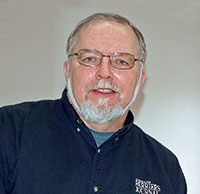There’s something to be said for shoeing horses where the money is. There’s also something to be said for doing the kind of work you love in a place that you love.
I’m in Baton Rouge, La., this week, attending the American Farrier’s Association convention. AFJ Technical Editor Red Renchin and I spent a day with local farrier Jimmy Gore, a 39-year veteran of the craft.
Gore’s day was relatively light. He trimmed and shod several pasture horses for a couple of his regular clients and handled one therapeutic case that was bought to his well-equipped shop a few miles outside the city. The following day, we joined Gore at a local Arabian farm, where he set up a young horse with his first shoeing package.
Good Economy A Boost
Gore has the best of both of those worlds I just described. He has spent his entire life in this area and his shoeing business has flourished. He also loves the area he lives in, as well as the work he does.
Gore believes the local horse economy is strong — if not as strong as it once was. It benefits from a stronger than average economy in the Baton Rouge area. That stronger overall economy helps sustain the equine sub-economy, even during the recent recession. That, in turn, keeps good farriers working.
Baton Rouge is the state capital and also home to Louisiana State University and Our Lady of the Lake Regional Medical Center. The city also benefits from its dual status as a shipping port. It handles barge traffic through the Mississippi River system and deep-water shipping from the Gulf of Mexico. Baton Rouge also benefits from jobs in the oil and gas fields as well as other industries.
That diversity allows the economy to withstand economic downturns better than many others— although clearly no area is completely immune.
Almost all of Gore’s clients are right around Baton Rouge. He’s actually reached a point in his career where a sizeable percentage of his clients actually bring their horses to his shop. But as is the case in many similar prosperous urban areas, the benefits of the Baton Rouge economy only extend so far for horseshoers.
A Few Miles Means Fewer Dollars
“If you get much more than 50 miles from the city, you won’t find the same quality of horses,” Gore says. “And you won’t find the clients who will pay $160 to $200 to have a horse shod.”
Renchin notes that the same thing was true of the areas where he spent the majority of his career — suburban Milwaukee in Wisconsin and Wellington, Fla. Top farriers in those areas can charge good prices for their work, while farriers only a couple of hours of driving time away may be able to do the same quality of work, but are likely to have to settle for a fraction of the money.
So every farrier should pack up and move to Baton Rouge, Wellington or some other area where the economy is booming, right?
Obviously, it’s not that simple. Gore benefits from the local economy, but he’s also well established in the area. He notes that there are a lot of very good horseshoers around Baton Rouge, which means new ones — even good ones — will probably have trouble finding good clients. Housing and living costs also tend to be higher in urban areas and city or suburban living is not for everyone.
So if you can’t — or don’t want to — move to those areas where farriers can charge more, how do you get ahead?
In almost 13 years with American Farriers Journal, I’ve done more than 50 of our “Shoeing For A Living” features. Those stories have allowed me to spend days with farriers at racetracks, at Thoroughbred farms and preparing horses for Grand Prix shows. I’ve also accompanied farriers who put in the same kind of effort preparing a fat pony for a 4-H horse show or taking on a nasty case of thrush while shoeing a backyard horse under a tree.
What the best of these farriers had in common was not just a passion for the work, but also a passion for getting better at it. Working hard at improving your shoeing skills, professionalism, business practices and relationships with clients will do more to improve your finances than a quick move to an area where it seems other farriers have it good.
As your skills grow, so will your ability to command higher prices for your work. That will be directly related to the increasing value your clients place on their relationship with you. It won’t happen overnight, but it will happen.
When it does, you’ll also have the best of both worlds: Doing work you’re passionate about and being well compensated for it.







